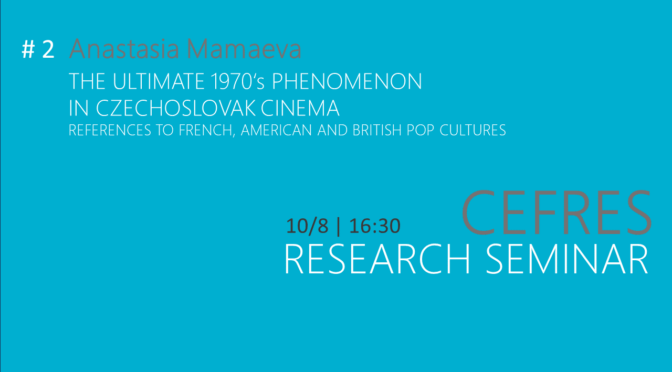References to French, American and British Pop Cultures as the Ultimate 1970s Phenomenon in Czechoslovak Cinema
2nd session of CEFRES in-house seminar
Through the presentation of works in progress, CEFRES’s Seminar aims at raising and discussing issues about methods, approaches or concepts, in a multidisciplinary spirit, allowing everyone to confront her or his own perspectives with the research presented.
Location: CEFRES Library & Online
Date: Tuesday, 8 Octobre, 2024 at 4:30 p.m.
Language: English
Contact / To register: cefres[@]cefres.cz
Anastasia Mamaeva (CEFRES / CNRS)
Chair: Františka Schormová (Institute of Czech Literature, Czech Academy of Sciences)
Abstract
While working on the references to French, American, and British popular cultures in the 1970s Czechoslovak cinema, one of the challenges has been for me to find concepts and approaches that would on one hand give its due to the diversity and originality of this cinema, and on the other hand lie outside the field of Central European and Soviet Studies. Such approaches would enable me to form a novel approach to the body of artworks whose ostensible ideological and political context often eclipses their artistic value, the complex dialogue with their own national heritage and the potential they hold for rediscovery and viewing outside of their immediate context.
Moreover, I have come to the conclusion that the indiscriminate application of concepts like pop culture flattens my studies. This is why the ideas formulated from the 1970’s on by scholars associated with British Cultural Studies, ideas such as approaching film history as media history, present an elegant theoretical way out of the impasse that I’ve identified over the past three years. Charles R. Acland’s chapter “British Cultural Studies, Film History, and Forgotten Horizons of Cultural Analysis” in the new book How Film Histories Were Made: Materials, Methods, Discourses, (Amsterdam University Press, 2024) offers a panorama of ideas, formulated by the founders of the movement, such as Stuart Hall, that can be useful for contemporary interdisciplinary and intersectional studies. Acland draws attention to the material aspects of film and its relation to everyday non-filmic practices. Last but not least, his text stresses the importance of today’s “archival turn”, as the internet allows access to previously inaccessible media whose archaeology has proven stimulating for my own research.
In my presentation, I will present the overview of the British Cultural Studies’ ideas as presented in Acland’s text and discuss how they have been applicable in my own project.
Reference text:
- Charles R. Acland, “British Cultural Studies, Film History, and Forgotten Horizons of Cultural Analysis”, in How Film Histories Were Made: Materials, Methods, Discourses, Amsterdam University Press, 2024. https://www.jstor.org/
stable/jj.14170605.14
See the complete program of 2024–2025 seminar here.

